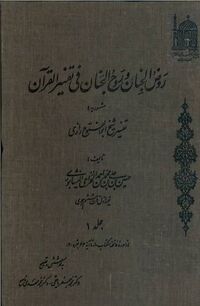Abu l-Futuh al-Razi, a remarkable figure in Shia scholarship, offers profound insights into the teachings of Islam through a critical lens. As one delves into his works, one may ponder: How do the intricate interpretations presented by al-Razi enrich our understanding of the Shia faith? This question invites exploration not only of his individual contributions but also of the broader implications they possess for Shia thought and practice.
Born in the 12th century, Abu l-Futuh al-Razi emerged as a pivotal commentator, whose writings reflect a synthesis of theology, philosophy, and jurisprudence. His magnum opus, "Rawdat al-Jinan," serves as a compendium of Islamic teachings, specifically tailored to elucidate Shia perspectives. The text is notable for its rich literary style and thorough examination of doctrinal issues, making it an invaluable resource for scholars and laypersons alike.
One cannot discuss al-Razi's contributions without acknowledging his emphasis on the foundational principles of Tawhid (the oneness of God). His approach encourages followers to engage in a nuanced understanding of Allah’s attributes. Rather than viewing God through a monolithic lens, al-Razi posits that the divine essence encompasses both mercy and justice. He challenges readers to reflect on how these attributes manifest in the world. Can we reconcile divine mercy with human suffering? This inquiry not only spurs intellectual engagement but also creates a space for critical self-reflection among believers.
Moreover, al-Razi's exploration of the concept of Imamate is central to Shia theology. He articulates that the Imams are divinely appointed leaders, whose authority extends beyond mere political governance. By examining the lives of the Imams, al-Razi underscores their role as spiritual guides, possessing esoteric knowledge and moral impeccability. This assertion raises a tantalizing question: How do the teachings of the Imams inform contemporary ethical dilemmas faced by Shia Muslims today? As one wrestles with modern issues, such as social justice and environmental responsibility, the teachings of al-Razi invite a dialogue with the past.
In addition to his theological insights, al-Razi's jurisprudential contributions merit considerable attention. His interpretations of Islamic law are marked by a distinctive pragmatic approach. He emphasizes the need to adapt legal rulings to the evolving socio-political landscape, urging scholars to consider the underlying principles rather than relying solely on textual literalism. This adaptability presents a challenge; how can one ensure that the original spirit of Islamic law is preserved while allowing for contemporary relevance? Such queries are essential for the progress of Islamic jurisprudence within the Shia tradition.
Al-Razi's method of engaging with previous scholarship also exemplifies a critical approach to Islamic knowledge. He often cites earlier scholars, both Shia and Sunni, to highlight areas of consensus and divergence. By adopting this dialectical method, he not only enriches his own arguments but also offers a model for constructive discourse. This interplay of ideas raises a provocative thought: In what ways can modern scholars follow al-Razi’s example to bridge the gap between varying interpretations within the Muslim community?
Furthermore, al-Razi’s exposition on ethical conduct reflects a profound understanding of human psychology and social dynamics. He emphasizes virtues such as honesty, humility, and compassion as cornerstones of a fulfilling life. His reflections challenge adherents: How can one embody these ideals in a world rife with distractions and moral ambiguities? Al-Razi’s teachings serve as a guiding light, encouraging introspection and genuine self-improvement among followers.
One of the elements that distinguishes al-Razi's thought is his integration of philosophical reasoning with religious doctrine. He deftly navigates complex metaphysical discussions, effectively demonstrating that reason and faith are not mutually exclusive. This synthesis invites believers to engage critically with their faith, fostering a robust intellectual environment. In this context, the question arises: How can modern-day Shia Muslims harness philosophical inquiry to address pressing existential questions?
As we reflect on the legacy of Abu l-Futuh al-Razi, it becomes evident that his teachings extend far beyond mere historical record. They offer a lens through which contemporary challenges can be examined and understood in light of Shia Islam. The interplay between tradition and modernity, the balance of authority and personal interpretation, and the pursuit of ethical living are all central to the ongoing dialogue within the Shia community.
Ultimately, the teachings of Abu l-Futuh al-Razi not only shape individual beliefs but also contribute to the collective identity of Shia Muslims. His works remain a crucial resource in fostering a deep and meaningful engagement with faith. As adherents revisit al-Razi’s insights, they are reminded of their responsibility to cultivate knowledge, engage in ethical conduct, and embrace the complexities of their faith within a modern context.
In conclusion, as we navigate the intricacies of faith and practice, the teachings of figures like Abu l-Futuh al-Razi serve not only to enlighten but also to challenge and inspire. They call upon each believer to delve deep into the essence of their faith and to participate actively in the ongoing journey of knowledge and self-discovery within the Shia tradition.


